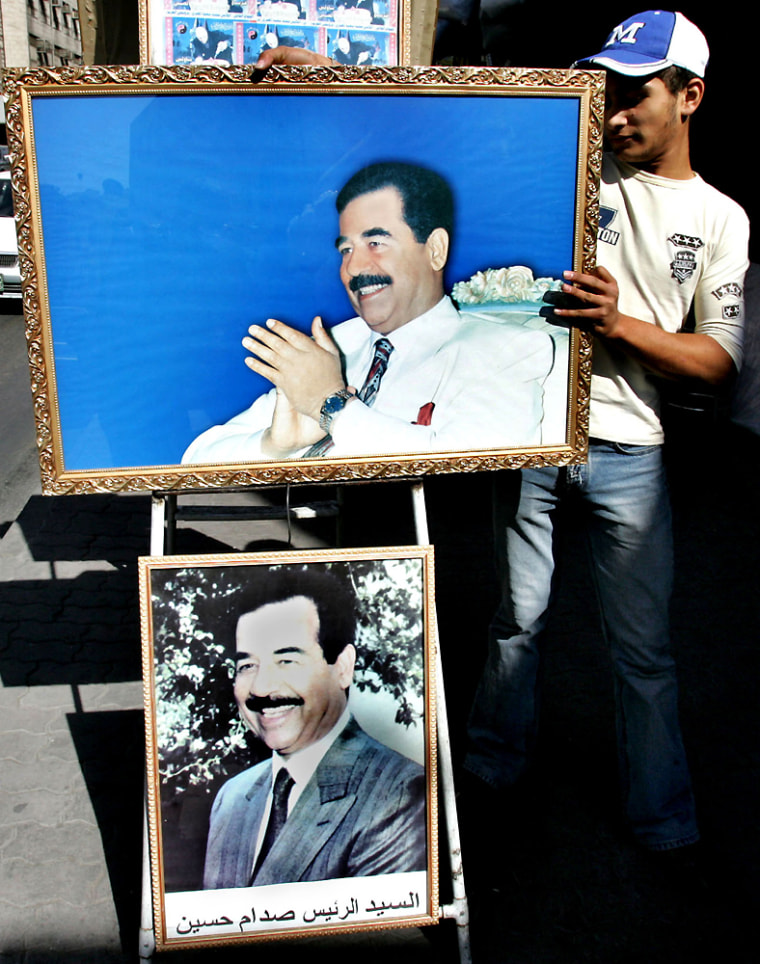Among Iraqis who have fled here, and across the Arab world, people are eyeing the start of Saddam Hussein’s trial with hope in some cases, trepidation in others — and sometimes with outright anger.
“How can Saddam get a fair trial when there’s no government in Iraq? How can they try him?” asked Ismail Makki, a poor Shiite Muslim from the southern Iraqi city of Basra, as he hawked fruits and vegetables in Amman’s bustling downtown marketplace.
“There’s no water, electricity or security,” he yelled. “If he stayed in power, it would be better for us.”
At the same marketplace, Iraqi chemist Taher Al-Sahab also defended Saddam.
“He is not guilty,” said the Shiite from Karbala, one of his sect’s holiest cities in Iraq. “He won’t get a fair trial in Iraq.”
Asked about Saddam’s alleged massacre of thousands of his countrymen during his 23-year rule, Al-Sahab said tartly: “Now, more Shiites are being killed in suicide bombings.”
Others, however, are happy about what they view as a chance for retribution.
‘I want to kill Saddam’
Nura, a 17-year-old Shiite from Baghdad, strolling with her mother in a fancy mall in Amman where many affluent Iraqi exiles go, said she wants Saddam to die for his crimes.
“I want to kill Saddam, all the people want that,” she said, refusing to give her full name for fear relatives in Iraq might be punished. “The Iraqi people are destroyed because of him,” she said.
Saddam and seven other members of his ousted regime are due to stand trial beginning Wednesday before an Iraqi court in the first of what is expected to be several trials.
They are charged with ordering a massacre of 143 people in Dujail, a predominantly Shiite town north of Baghdad, in 1982 after a failed assassination attempt against the ousted leader.
If convicted, Saddam could be sentenced to death.
Source of pride, and pain
Across the Arab world — not just in the Iraqi exile community — emotions are mixed about a former leader viewed by some as a source of Arab pride, but considered by others as a tyrant who oppressed his own people and attacked Iran and Kuwait.
Badr al-Shatti, a 40-year-old civil servant from Kuwait, which Saddam invaded and occupied for seven months in the early 1990s, said a trial was too good for Saddam.
“He should have dangled from a noose, his head should have been decapitated, or he should have been shot,” Al-Shatti said.
Mainstream media and pan-Arab satellite television stations like Al-Jazeera have devoted considerable time to explorations of the charges and the trial. Al-Jazeera has shown footage of atrocities from Saddam’s regime.
Extremist Web sites have been mostly silent on the issue. But Saddam’s Baath party issued a statement, published Tuesday in the London-based Arab daily Al-Quds Al-Arabi, claiming the trial was illegitimate and urging insurgents to use its start to step up killing of “occupation soldiers.” The statement’s authenticity could not be independently confirmed.
Iraqi exiles weigh in
Feelings are perhaps strongest among Iraqi exiles. One exile in Sharjah, the United Arab Emirates, described the proceedings as a U.S. public relations bid to prop up its failing project in Iraq.
“This is just a show to distract the Iraqi people. What Iraqis need is security now, not security 20 years ago,” said the exile, Saadallah al-Fathi, a former OPEC official who once worked as an adviser to Iraq’s Oil Ministry. “My family is suffering there. Who cares about the trial of Saddam?”
His anger is deep about his country’s situation.
“We were told that as soon as the United States invaded, everything would be fine,” he said. “Well, it wasn’t fine. We were told things would get better once they captured Saddam. Then things got 10 times worse. They told us when we get a government, Iraq will be like California. Nothing could be further from reality.”
